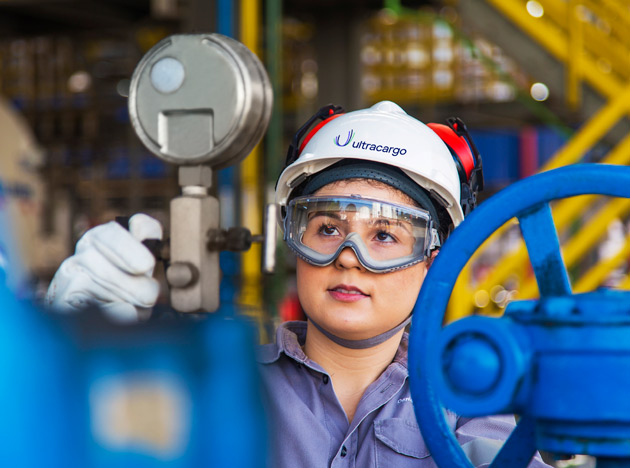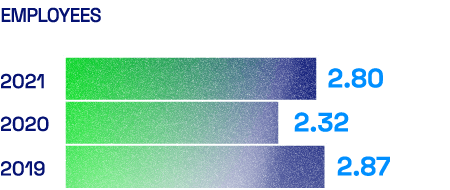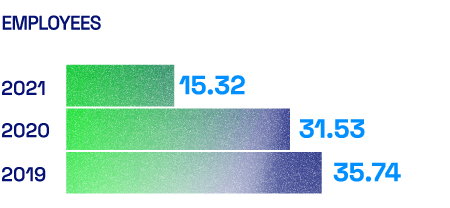Health and Safety


 Performance
Performance Social and relationship capital
Social and relationship capital Human capital
Human capital
alignment to the SDGs

![]()
Given the nature of the activities of its businesses, the Ultra Group has always been committed to increasingly prioritize the health and safety of its employees, contract staff and suppliers. This commitment also includes process safety in order to prevent damage to the environment and the communities surrounding its operations.
The management of health and safety is carried out both directly by the individual businesses, which have policies, systems and programs in place, and also in an integrated cross-cutting manner through the Group’s Safety Committee, composed of senior managers from the Group. This committee is coordinated, in sequence, by one of the businesses’ CEOs.
Health and safety is one of the material topics in the sustainability strategy, and in 2021 the Group worked on the definition of the joint objectives for 2030.
Management

The Holding and the businesses have health and safety management systems, based on international standards. The relevant indicators are monitored, for example, frequency of accidents, occupational diseases and lost days and the related procedures and programs are constantly being improved.
The management of health and safety includes the identification of the risks and dangers in the execution of the activities, by specialist technical teams. Many different measures are taken to engage all employees in the commitment to a safety culture, as follows: regular training courses, communication campaigns, risk assessments and inspections, safety discussions, channels for reporting deviations, regular health monitoring, fire brigades and Internal Accident Prevention Commissions (Cipas) installed in each unit, among other actions. The contract staff working in the Holding and the business units undergo training courses, and are oriented to comply with safety rules. Furthermore, they participate in awareness campaigns and other engagement actions, such as the activities organized in the Internal Weeks for the Prevention of Accidents at Work (Sipats).
There are also a number of committees that meet regularly to monitor health and safety performance. The managers of the units and the senior management of the businesses participate in these committees. Employees in non-management positions also participate in the discussions on key health and safety issues through the regular Cipa meetings held in the units.
In 2021, the consolidated accident frequency rate for the Ultra Group was 2.80, an increase of 20.8% compared to 2020. However, compared to 2019, there was a 2.3% reduction in the indicator. The Group’s accident severity rate decreased by 51.4% compared to the previous year and 57.1% compared to 2019. For more information on the indicator for 2021 see the appendices
All occupational incidents and accidents are analyzed and are the basis for improvements to management systems, corrective measures, reinforcement of prevention and training and making physical changes in the workplace, when necessary.
Well Being

Based on a vision of integrated care, in 2021, the Holding launched the Ultra Well-being project. Employees are invited to answer a short online questionnaire twice a week. The Health area monitors the data on a weekly basis and, depending on the responses, may contact certain employees. If help is required, employees may be referred for specialized treatment. In the first six months of the program, 89% of employees responded voluntarily to the questionnaire. The health profile of the entire team was also assessed. The results will be used to support the planning of health promotion actions in the Holding.
The businesses have also been investing in quality of life and well-being programs for employees. Ultragaz instituted the Valoriza well-being program and Ipiranga entered into a partnership with a digital platform that provides online consultations with specialized health and well-being professionals and access to content on self-care and self-knowledge.
Safety Culture

In 2021, Ultragaz, Ultracargo and Ipiranga carried out new surveys to assess the level of maturity of the safety culture in their respective companies and, based on the results, established new strategic plans to prevent and mitigate the occupational health and safety risks and hazards present in the workplace and inherent to the operations.
The assessments were comprehensive processes that included individual interviews, formation of focus groups and on-site visits. The surveys involved 744 employees in Ultragaz; 286 in Ultracargo; and 784 in Ipiranga.
Oxiteno has been implementing the initiatives set out in its Global Safety Culture Transformation Plan, such as training 271 employees from a number of different areas to support the work of the Health and Safety teams in the units. The company also carried out an assessment of its operations in the United States in order to improve the safety culture from 2022 onwards.

-
GROUP AMBITION
Achieve an 85% level of satisfaction in terms of an inclusive environment
Certified Units
All Ultracargo’s terminals (except for the Vila do Conde terminal, recently opened), Oxiteno’s industrial units in Brazil, and Ipiranga’s pool in Betim (MG) have been certified for occupational health and safety under ISO 45001. Oxiteno’s industrial units in Mexico, Uruguay and the United States, have obtained the Responsible Care certification.
ESG Dashboard
Accident frequency rate – Ultra Group

Accident severity rate – Ultra Group

New measures to strengthen a safety culture in the businesses.
Cross-cutting vision of the health of the entire employee team, with attention also paid to emotional equilibrium and well-being.
COVID-19 Prevention
Maintenance of measures to preserve the health of employees and the continuity of operations.
Monitoring of all employees with a suspected or confirmed diagnosis of Covid-19, until medical discharge, by the Health and Safety teams.
Vaccination Monitoring
79.3% of the Group’s 16,300 employees had been fully vaccinated (with two doses or a single dose depending on the vaccine) by December 2021.